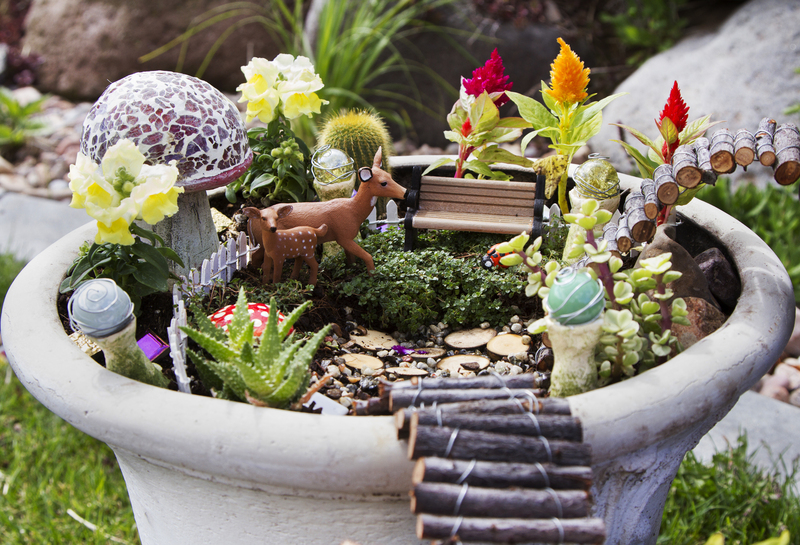Sustainable living through container gardening
Posted on 06/09/2025
Sustainable Living Through Container Gardening: A Comprehensive Guide
Sustainable living is more important than ever as we face the realities of climate change, pollution, and dwindling resources. One effective and rewarding method for embracing eco-conscious habits is container gardening. This article provides a thorough exploration of how container gardening for sustainability can benefit you, your community, and the environment. Whether you are a novice or an experienced gardener, you will find actionable tips and inspirational ideas for maximizing your green space--no matter how small your home or apartment might be.

What Is Container Gardening and Why Does It Matter for Sustainable Living?
Container gardening simply refers to growing plants in pots or containers rather than directly in the ground. But, as simple as this concept is, container gardening for a sustainable lifestyle is a powerful tool to:
- Reduce your carbon footprint by growing produce close to home
- Minimize waste through reuse of materials as pots and planters
- Conserve water and resources with focused irrigation
- Enhance urban biodiversity and support pollinators
By embracing sustainable living principles through container gardening, even city dwellers with limited space can contribute to environmental well-being while reaping the rewards of homegrown herbs, vegetables, and flowers.
Benefits of Container Gardening for Sustainability
1. Efficient Use of Resources
With eco-friendly container gardens, resources like water and soil can be managed more efficiently. Containers restrict unnecessary water loss and prevent weeds from competing for nutrients, leading to healthier plants with less waste.
2. Accessibility and Versatility
Container gardening democratizes the ability to grow food, making it possible for anyone--regardless of their living situation. From apartment balconies to rooftops and windowsills, sustainable gardening in containers ensures fresh produce is never out of reach.
3. Eco-Conscious Materials and Upcycling
Containers can be made from a multitude of upcycled materials such as old buckets, cans, wooden crates, or even worn-out kitchenware. This not only reduces demand for new products but also keeps waste out of landfills.
4. Enhances Mental Health and Community Well-being
Tending to plants can reduce stress, encourage mindful habits, and foster a strong sense of community if space and produce are shared or exchanged with neighbors. Container gardens for sustainable urban living are both therapeutic and communal.
Getting Started: Steps to Create a Sustainable Container Garden
You don't need sophisticated skills or expensive tools to get started. Here are essential steps to begin your sustainable living journey through container gardening:
1. Select the Right Containers
- Size: Make sure containers provide enough room for root growth.
- Material: Opt for biodegradable, recycled, or upcycled containers.
- Drainage: Good drainage is critical to prevent water logging and root rot.
2. Choose Sustainable Growing Mediums
- Organic Potting Soil: Avoid peat-based mixes to help protect wetlands and choose locally sourced, organic potting soil for your eco-friendly container gardens.
- DIY Compost: Incorporate homemade compost to enrich the soil and reduce food waste.
- Mulch: Use natural mulches like straw or bark to retain moisture.
3. Opt for Local and Edible Plants
- Native plants require less maintenance and water.
- Herbs such as basil, mint, and chives thrive well in pots.
- Grow quick-yielding vegetables like tomatoes, lettuce, radishes, and peppers.
- Incorporate pollinator-friendly flowers to support beneficial insects.
4. Implement Water-Saving Techniques
- Use self-watering containers or drip irrigation to minimize water use.
- Collect rainwater for garden irrigation to further reduce your environmental impact.
- Mulch heavily to decrease evaporation and keep roots moist.
5. Embrace Organic and Sustainable Practices
- Avoid synthetic pesticides and fertilizers. Use natural alternatives like neem oil or companion planting.
- Rotate crops in your containers to maintain healthy soil and minimize pests.
- Re-use or repurpose containers whenever possible to avoid unnecessary waste.
Sustainable Container Gardening: Tips for Urban Dwellers
Living in a densely populated city doesn't mean you can't enjoy the perks of a green, sustainable space. Here are tips tailored for those with limited room:
Vertical Gardening for Sustainability
- Wall-mounted planters: Make use of walls, railings, and fences.
- Stackable containers: Grow more in less space by stacking or using tiered systems.
- Hanging baskets: Perfect for herbs and small flowering plants, and save crucial horizontal space.
Balcony and Rooftop Gardens
- Ensure containers are lightweight and stable for elevated areas.
- Group pots to create microclimates and conserve water.
- Use privacy screens with climbing edible plants like beans or peas that also provide shade.
Making Container Gardening Even More Sustainable
Embrace Upcycling and Repurposing
Rethink what constitutes a planter. Old boots, tin cans, or even broken furniture can serve as unique containers, turning potential waste into productive garden space. This is the true essence of sustainable living--reusing what we have.
Composting in Small Spaces
Even with limited room, you can compost kitchen scraps in small countertop bins or worm bins. The resulting compost is a valuable resource for feeding your sustainable container garden.
Reduce, Reuse, and Share
- Swap seeds and cuttings with friends and neighbors.
- Share excess harvest through local food banks or community organizations.
- Host a workshop or participate in community container garden projects.
The Environmental Impact of Container Gardening for Sustainable Living
The collective effect of many individuals adopting sustainable container gardening can substantially aid in:
- Reducing transportation emissions--homegrown produce doesn't need to be shipped from afar.
- Improving air quality--plants help absorb pollutants.
- Combating urban heat islands--rooftop and balcony gardens offer cooling effects.
- Biodiversity enhancement--native blooms and food sources attract essential insects and birds.
By choosing to grow sustainably, we become less reliant on industrial agriculture, reduce packaging waste, and foster a deeper connection with the rhythms of nature.
Sustainability and Well-Being: Personal and Community Benefits
Healthier Lifestyles
Consuming homegrown produce free from synthetic chemicals is healthier for you and your family. Gardening also encourages more physical activity and time spent outdoors (or near windows and sunlight).
Educational Opportunities
Sustainable container gardening is a chance to teach children and adults alike about ecology, biology, and the rewards of self-sufficiency.
Financial Savings
Growing herbs and vegetables at home can help reduce grocery bills. Upcycling materials for containers and composting kitchen waste means less need for external purchases.
Building Stronger Communities
Community container gardens or shared rooftop spaces can bring together neighbors of all ages and backgrounds, fostering collaboration, learning, and food sharing.
Overcoming Common Challenges in Sustainable Container Gardening
Limited Space
Vertical gardening and using compact, high-yield plants can optimize the smallest areas. Look for dwarf or determinate plant varieties.
Pest Management Without Chemicals
- Handpick pests when possible.
- Encourage natural predators such as ladybugs and lacewings by planting flowers like dill and alyssum.
- Use barriers like netting or companion planting for natural pest deterrence.
Soil and Nutrient Management
- Refresh container soil annually with compost and organic fertilizers.
- Rotate crops to avoid depleting soil nutrients.
Tip: If you notice poor soil drainage, adjust your potting mix with sand or perlite and ensure containers have proper drainage holes.

10 Sustainable Container Gardening Ideas for Beginners
- Grow salad greens (lettuce, spinach, arugula) in window boxes for a constant harvest.
- Herb spiral in pots -- plant culinary herbs in a spiral arrangement with different pot sizes to maximize sunlight and space.
- Use old buckets as tomato planters -- make sure to add drainage holes at the bottom.
- Stacked strawberry towers -- recycle old PVC pipes or stackable pots for vertical growing.
- Self-watering containers -- repurpose plastic bottles or tubs into wick irrigation systems.
- Mini fruit trees -- try dwarf citrus or fig trees in large, well-drained containers for balconies.
- Pollinator-friendly flower pots -- mix marigolds, nasturtiums, and borage to attract bees.
- Worm bin composting -- collect food scraps below your containers for a continuous nutrient source.
- Tea can or coffee tin planters -- ideal for growing small-rooted herbs on kitchen counters.
- Portable vertical garden frames -- construct frames from recycled wood to hang planters on any sunny wall.
Conclusion: Why Embrace Sustainable Living Through Container Gardening?
In an era where every action counts, container gardening as a sustainable living practice empowers individuals to live more lightly on the earth. By making conscious choices about our food, resources, and waste, we create healthier urban environments and meaningful personal change.
No matter your space or experience level, getting started with sustainable container gardening is easy, fun, and incredibly rewarding. You'll enjoy fresher food, reduced environmental impact, and the simple joy of nurturing life right outside your window (or even inside your home!).
Ready to transform your lifestyle? Start your journey to sustainable living through container gardening today, and grow a greener future for yourself and your community.
Latest Posts
Creating a Garden Retreat for Dog-Loving Households
Your roadmap to perfecting orchid care
Harness Tranquility with Inspiring Zen Garden Concepts

